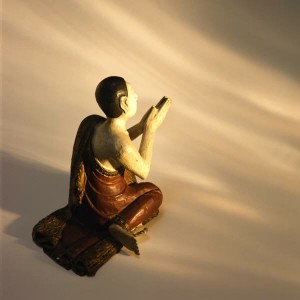
In ancient times there was a conquering army going through villages wreaking havoc and mayhem. The soldiers killed indiscriminately and were especially harsh on the monks, taking special care to humiliate and torture them, before killing them. When the army arrived in a town the general asked for a report. His subordinate replied, “The population is subdued and terrified!” This gave the general some satisfaction. Then the subordinate continued, “In the local monastery all monks have fled, except one.”
Hearing this, the general became furious. He rushed to the monastery to meet the monk who dared defy him. When he saw the monk he pulled his sword out and pushed it towards his stomach and hissed in a low but terrifying voice, “Don’t you know who I am? Why, I could take this sword and run it through your belly without blinking my eye!”
The monk was not fazed, he replied gently, “And don’t you know who I am? I could have your sword run through my belly without blinking an eye.”
The general was awestruck by the fearlessness and the deep spirituality of the monk. He sheathed his sword, bowed, and left without uttering another word.
Mahatma Gandhi said, “Fearlessness is the first prerequisite of a spiritual life”. Fear is the creation of the ego and as long as our attention and thoughts are related to fear, we are fully subsumed in our ego and far from a spiritual experience. But the flip side of this is that without coming out of the ego and directly experiencing a deeper Reality it is difficult to be fearless. How can we trust the existence of a deeper Divinity on mere hearsay? So here is a chicken and egg problem: Without fearlessness there is no spirituality and without spirituality there is no fearlessness. How do we come out of this?
The drama created from our fears by our ego is a subtle mechanism that keeps us engrossed at the level of our ego. All our fears are directly related to the ego. The fear of embarrassment is the ego’s desire not to look stupid in front of others. The fear of loss of health, love, or wealth reflects the ego’s desire to be in control. The fear of failure is connected with a desire of the ego to grow in size and importance. The fear of death reflects the ego’s aversion of being annihilated into non-existence. On the other hand the soul knows no fear. It simply exists in peace and joy, unaffected by our day-to-day concerns. It is no wonder that fearful state of the ego and the fearless state of the soul are incompatible. The question for us then is how do we proceed from the state where fear dominates our thinking to a state where we are predominantly fearless?
Some are born with a strong sense of the spiritual. Some fall into a state of heightened spiritual awareness spontaneously or due to some deep shock to the ego-mind-body system. But for the rest of us who seek a more systematic path the answer lies with the different paths of yoga. This may seem as stating the obvious as the definition of yoga lies in the movement out of the ego into a deeper Self. However it is important to understand that there is no single answer and there are many paths. Some of these may be with following a religion or religious doctrine. There is no incompatibility between yoga and religion, and yet it is also true that there is no need for a religious belief to pre-exist for yoga to succeed.
The numbers of paths of yoga are numerous: each one suited to a particular situation, or personality type, or the state of spiritual evolution of a person. Some of us may have to bounce around till we find a true fit while others may quickly settle on one path for life. Sometimes as we make progress we may find that we outgrow a given approach and may have to move on and find a new path that better fits our current situation. How do you know that you are on the right path and making progress? The answer lies within. Check your deepest thoughts. If you find yourself spending less time in thoughts relating to fear then you are on the right track.
You may also like: Are You A believer?

It was something I was searching for long-something that’s closest to my thinking. Free of
dogma and belief system-flexible to incorporate all kinds of personalities, encouraging an individual to
have his own way which need not match anyone else’s. Exploring the true self-with freedom of path. No enforcing, no commands, no rules to follow. Meditative. I love it. Thank you for the article.